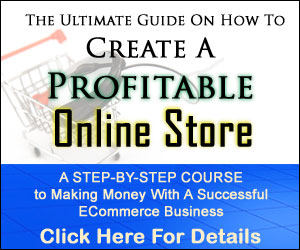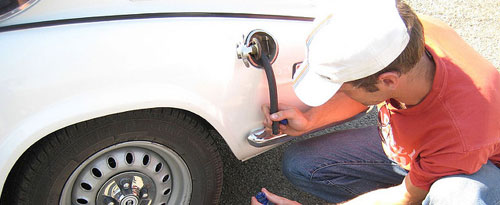Way back before my wife and I started our online store, we were primarily selling on Ebay. In a nutshell, we would import textile goods from Asia, throw up a bunch of auctions and then monitor them closely for sales.
Those of you who have followed me since the beginning also know that I used to run an Craigslist/Ebay arbitrage business that made 4 figures a month at its peak.
Anyways as sales started to increase, I graduated from launching individual auctions to opening up an EBay storefront which did ok for a while, but eventually stagnated in terms of profit growth.
People often ask me whether using EBay is worth the time. And the truth is that EBay is a great place to dip your toes in the water and get used to selling online, but it’s a non-optimal place to make a lot of money in the long run. It can also be quite risky depending on your sourcing model.
For one thing, Ebay charges a ridiculous double digit percentage final value fee and another 2-3% for Paypal which pretty much sucks out a good portion of your profit margins with every sale.
The other reason is that EBay caters to a very specific audience. For example, I shop online a lot but I rarely shop on EBay for anything. To me, EBay is a great place to find used bargains rather than shop for new items.
If you are limiting your sales just to EBay, you are missing out on a huge piece of the market. Furthermore, I’ve found that EBay shoppers tend to be cheaper in general and are not willing to pay a premium for your goods.
Get My Free Mini Course On How To Start A Successful Ecommerce Store
If you are interested in starting an ecommerce business, I put together a comprehensive package of resources that will help you launch your own online store from complete scratch. Be sure to grab it before you leave!
The Next Logical Step
Once you’ve extracted as much value out of EBay as possible, the next logical step is to start your own online storefront. But don’t be scared and make the same mistakes that I did.
My wife and I didn’t start our own online store for the longest time because we were afraid that we wouldn’t be able to get traffic for our own website.
But the truth is that you don’t have to stop your EBay sales cold turkey. There are logical steps that you can take in order to make the transition from an EBay shop to your own online store as smooth as possible.
And once you’ve fully made the transition, it’s up to you whether you want to still keep your EBay shop open. For my wife and I, our real online store did so much better than our EBay shop over time that we felt it wasn’t worth the inventory and administrative headaches to maintain both shops.
And while there are software services that you can purchase to help maintain coherency between your real shop and EBay, you’ll probably find that you can charge a lot more money for your goods with the online shop you own.
Making The Transition
Chances are when you first start out with your own store, you aren’t going to be attracting a lot of traffic and this is where EBay can help. Ideally, you want to siphon as much traffic away from EBay to your own web property as possible.
But be careful. If you start adding links to your own website in your auctions, you’ll eventually get banned. In general, it is against EBay’s terms of service to purposely try to lure customers away from EBay’s website.
In addition, EBay discourages any sort of transactional activity outside of its walls because they won’t make any money that way.
Your About Me Page
The first thing that you should do is to add an about me page to your EBay profile. Your “About Me” page is the only place on EBay that you can legally add a link to an outside website.
While most customers will base their purchasing decision purely on the feedback rating, sometimes they’ll also take a look at your about page. And if they see that you have your own website, they may actually click through to take a look rather than having to wait for an auction to end.
If you do manage to get them to go to your actual website, the chances of landing a sale on your own property is infinitely higher because…
- You can provide customers with a much better shopping experience on your own website. Unlike plain old boring EBay listings, you can really make your unique value proposition shine on your own site because you have full control over the customer experience.
- You can specifically incentivize EBay customers with bundles and discounts. Heck if you’re going to pay 12-15% in final value fees to EBay anyways, you may as well pass some of that money back to the customer
- You can upsell them with additional products or accessories and cross sell related goods as well
Encourage Repeat Customers To Shop On Your Site
Whenever you make a sale on EBay, you want to make sure that it’s the last time that customer ever buys from you again on EBay. If they need your products again, they better go back to your site directly!
This can be accomplished by using a few tried and true tactics. First off, make sure that you include your own marketing materials in your shipment to your EBay customer.
Drop in a business card and a full brochure of your goods. Make sure that your URL is prominently displayed on the box, on the receipt….basically everywhere! There should be no signs of EBay anywhere in sight.
Then, you should drop in a coupon code that is very specific to that customer. If they come back and go directly to your storefront, give them a discount that makes shopping direct less expensive than EBay.
Remember, EBay is charging you 12-15% already. So even giving a customer 10% off still nets you a greater profit than an EBay sale. By getting a customer used to buying from you direct and then upselling and cross selling them additional items, you can easily steal away a customer and make more money in the process.
Grab Their Email Address
Once they are on your site, try to grab their email address as well. As part of your swag that you include in your product packaging, you should also include additional incentives if a customer signs up for your free newsletter.
For example, you can give them something for free or a bonus item in exchange for their information. Once you have their email address, you can then market to them directly and bypass EBay entirely.
Conclusion
Over time, you will discover that EBay is eventually going to lead to a dead end and that starting your own online store is the right answer. Most people who want to own their own site assume that it’s one or the other but it doesn’t have to be that way.
Take advantage of the sales that you are already making on EBay to promote your own web property. And hopefully over time, your own shop will take off and you can leave EBay in the dust.
After all, a 12-15% increase in profit is nothing to sneeze at. Wouldn’t you rather be pocketing that money instead of giving it away to EBay? Here’s a list of other viable Ebay alternatives to explore as well!
photo credit: bradleyolin Thomas Leth-Olsen
Learn How To Start An Online Store

My course offers over 60+ hours of video and includes live office hours where you can ask me questions directly.
If you want to learn everything there is to know about ecommerce, be sure to check it out!

Ready To Get Serious About Starting An Online Business?
If you are really considering starting your own online business, then you have to check out my free mini course on How To Create A Niche Online Store In 5 Easy Steps.
In this 6 day mini course, I reveal the steps that my wife and I took to earn 100 thousand dollars in the span of just a year. Best of all, it's free and you'll receive weekly ecommerce tips and strategies!
Related Posts In Ecommerce Marketplaces
- Is Selling On Etsy Worth It? Learn Why It’s A Bad Idea
- Best 7 eBay Sniping Tools To Win Auctions Automatically
- Temu Review: Is Temu Legit And Safe To Buy From?
- Alibaba vs Amazon – Who’s Dominating Ecommerce And Key Differences
- How To Sell On Walmart: Tips For Selling On Walmart Marketplace

Steve Chou is a highly recognized influencer in the ecommerce space and has taught thousands of students how to effectively sell physical products online over at ProfitableOnlineStore.com.
His blog, MyWifeQuitHerJob.com, has been featured in Forbes, Inc, The New York Times, Entrepreneur and MSNBC.
He's also a contributing author for BigCommerce, Klaviyo, ManyChat, Printful, Privy, CXL, Ecommerce Fuel, GlockApps, Privy, Social Media Examiner, Web Designer Depot, Sumo and other leading business publications.
In addition, he runs a popular ecommerce podcast, My Wife Quit Her Job, which is a top 25 marketing show on all of Apple Podcasts.
To stay up to date with all of the latest ecommerce trends, Steve runs a 7 figure ecommerce store, BumblebeeLinens.com, with his wife and puts on an annual ecommerce conference called The Sellers Summit.
Steve carries both a bachelors and a masters degree in electrical engineering from Stanford University. Despite majoring in electrical engineering, he spent a good portion of his graduate education studying entrepreneurship and the mechanics of running small businesses.















Steve – Thanks for shortening up the E-bay learning curve by sharing your experiences and some great tips!
Hey Troy,
I was actually thinking specifically of you when I wrote this. Perhaps I’ll do a more specific video on this for the class.
I used eBay in the past to get rid of some items in and around the house
Dabbled with the idea of running a niche store, and I think I’ll get to analyze this approach later next year. I now focus on managing my niche site empire (I own about 300 aged domain names and niche blogs, mostly in the health industry)
If you’re interested to hear more, I’d love to answer your questions…
Best!
Wow John, that is a lot of niche sites:) I don’t think I could handle that many.
Great article! I’ve seen a few people make the transition described here. One gal was awesome at ebay but she had the same complaints about fees and unjustified complaints from ebayers. She did well the first year of her online store, mainly because she was aggressive at getting it done. I love to see people to take a risk in their own abilities, even if they have to hire a person to fill in the gaps.
Thanks Tom, I get emails from a lot of people who are on EBay right now and are afraid to make the transition. Ultimately it’s not that big of a deal, especially if you maintain both shops for a while.
Great advice! Our store is currently in the transition now and I believe most sellers on eBay have the same complaint fees, fees and more fees. I would love to see that 12-15% put towards our growing investment and take the leap.
You actually expect us to believe that you attract more clients to your online store that is buried somewhere on the internet than on ebay where they do all the seo for you for that little 8% commission on sales?..
Be honest…its incredible how some people can say anything if they are hiding behind their keyboards. ..
@maroun – I believe its do-able. The key is using the resources, knowledge and outsourcing to brand yourself over the dominate market. Its not easy but if you are prepared and willing to do the hard-work, it is achievable. I am positive there are companies out there that do 8-15% for SEO. I found mine through a contact. If you are willing to put time, effort and hard-work into your business branding anything is possible. Best of Wishes.
This is where I am at. I have owned a brick & mortar store so I feel 12 – 15% is not bad. I consider it a cost of doing business.
My ebay store is over 15 years established and going strong… still I am going to try my own store, I want to set myself apart as a brand. Making the transition with over 1,000 items… while I also run auctions has been a big job so far!
I am pretty sure most of my customers will make the move, I just have to figure out the process!
It’s best to keep your momentum going with eBay and have an eCommerce website! Getting our website going is NOT easy compared to eBay!
I’ve been selling computer parts on eBay for 8 years now. We ship out about 100 orders/day past 4.5 years
I agree with Steve Chou in regards to selling on your own website asap. But man it’s tough.
Hi Steve- Love your blog, one of the best in terms of info! I am brand new to the e-commerce game but eager to give it a shot! Just received your free E-course this weekend and am probably going to sign up for the larger course here in a bit. But I am also doing research elsewhere and have hit the wall of : Should I start selling on E-bay first for the experience and then open my own online store? or just go straight to the online store? Any quick thoughts on that?
That’s a complicated question to answer and it depends on your goals. Right now, the strategy I’m in most favor of is selling on Amazon and testing the market there first and then pulling the trigger on your own website once you know things will sell.
Wow, that was fast! Thanks for the speedy response. Amazon was my second option as well. I appreciate your opinion.
@Fred We’ve been selling computer parts on eBay for 8 years.
The challenges with Amazon is they “hold” your money for 15 days. With eBay you can withdraw your money daily. Then it takes about 3-4 Business days to clear your bank.
eBay is the easiest to get started on selling. Don’t worry about the fees. Your competitors have to pay the same fees on eBay. Same for Amazon.
In summary, start out on eBay. Then branch out to Amazon. Then expand to your website. If you start out with a website first, it can takes tons of time to get sales. (like weeks or months) With eBay you can be getting sales the next day or next week. Longer with Amazon but maybe 1-2 weeks.
Good luck and have fun!
Thanks Jeff, I was thinking of doing just that, E-bay to Amazon, then once I found my niche product, opening my own store. I appreciate your advice.
great advice Steve, I’m actually helping a client with moving away from ebay at the moment. your blog has great tips I can share with them.
@louie171 why not have an eBay selling presence AND a website? best, Jeff
hi @Jeff, totally agree with you !
Hi,
great article. Just a few questions…
Do eBay not mind if you link to your ecommerce site on your about me eBay page?
Do they also not mind if your eBay shop has the same name as your ecommerce shop? would having your eBay shop and URL the same as your ecommerce help with your ecommerce SEO?
Thanks
Is there a tool or software to be able to easily transfer the current listings you have on eBay to your own website so that you have the exact same inventory on both without having to transfer each one individually? I’m at the point where I am ready to create my website and have already done all the incorporating, Domain name etc. however I want and need the email listings on my own website! Thanks so much for any and all input I greatly appreciate it!! Chantel
I sell all the same items on Ebay as I do on my website.
Is it not against Ebay policies to send an Ebay customer a brochure or Business Card with their purchase to entice them to buy from your website in future?
My family has run a very successful ebay store for about 8 years now. Both of my parents quit their jobs and did it full-time, and I have helped part-time. They have transitioned into ministry now, so I am the only employee. We have over 11k products in our store, but sales have majorly declined. I am looking into how I would transfer all of the products onto our own website (not created yet). Any advice? a lot of our products have been online for years, so I’m not sure if its too late to transfer them. Thanks!